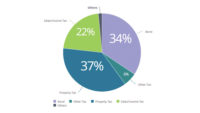Pandemic Sidelines Some November Infrastructure Ballot Measures
Backers of a $100-billion transportation funding “megameasure” for the San Francisco Bay area have suspended efforts to put the proposal before voters this November. It is one example of the increasing vulnerability of infrastructure ballot initiatives to economic uncertainties arising from the COVID-19 outbreak.
A statement issued March 18 by Faster Bay Area, a coalition of local business, government and planning groups, noted that placing the 1-cent sales tax increase on the ballot in nine counties was already a tall order, given the need to secure approval from state legislators and Governor Gavin Newsom (D) no later than June 24.
“These are not normal circumstances,” the statement said. With state lawmakers’ likely focusing on COVID-19 response for the foreseeable future, Faster Bay Area’s supporters opted to “push out beyond the 2020 election cycle” in hopes of advancing the measure’s “transformative policy changes” for addressing the region’s transportation needs at another time.
Elements of Faster Bay Area include improvements to existing managed lanes, rail, light-rail, bus and ferry systems to increase efficiency and service reliability, and a Regional Transit Network Planner to integrate the Bay Area’s 26 transit agencies into a single, seamless network.
Despite the mobility issues that have accompanied the Bay Area’s rapid population growth, the proposal’s prospects of success at the polls were anything but certain. Earlier this month, voters in three jurisdictions rejected separate transportation-related funding proposals.
COVID-19 uncertainty also led the Bend, Ore., city council to withdraw a $190-million transportation bond proposal from the state’s May 19 election list.
The measure, authorizing an increase to local property taxes, would have funded a variety of projects in the central Oregon city of nearly 98,000, including upgrades to several major thoroughfares, east-west connections and access to schools, parks and employment centers.
Although council members acknowledged the bond’s potential positive benefits for the local economy, they were not deemed sufficient to overcome other uncertainties associated with COVID-19. Bend is heavily reliant on tourism, and is already dealing with the closure of the Mt. Bachelor ski resort and many other major recreational attractions due to the outbreak.
Depending on the duration and extent of COVD-19 economic disruptions, Bend’s city council could bring the bond question back for the November general election, or next year.
Upstate in Portland, a $7-billion regional transportation bond referendum scheduled to go before voters in November could be in doubt as well. Metro, the metropolitan area’s transportation and coordinating agency, had hoped to finalize a formula of tax increases and vehicle registration fees for funding a variety of road and transit improvements by May.
Although that effort could be put on hold, Metro still has until mid-August to have a plan qualified for the November ballot.
Not all transportation funding proposals are being shelved because of COVOID-19. In Maine, the state legislature has approved placing a $105-million transportation bond proposal on the June 9 congressional primary ballot. Backed by Gov. Janet Mills (D), the measure would provide state-level matching funds to access as much as $275 million in federal funding for highway and bridge improvements and multimodal projects.





